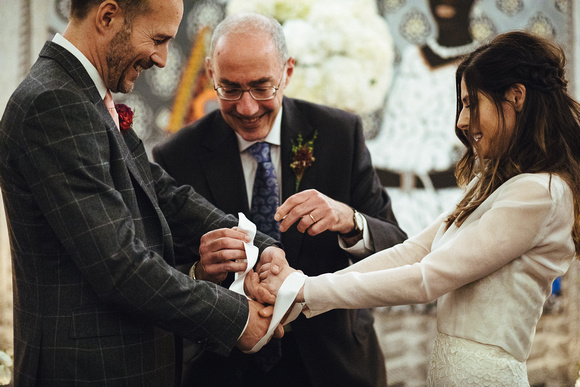
by Michael | May 4, 2018 | Blog
You may know the term “officiant” better as “civil celebrant”. Or you may not have even heard of either term!
If you’re planning a life-cycle ceremony like a wedding, it might be well worth your while to make the acquaintance of either. (By the way, the first term is the American version of the second.)
Why might you need one (or the other!)?
If you’re planning your wedding, it may not be a traditional religious service that rocks your boat. In truth, the idea of a register office ceremony may not appeal too much either. Many people shrug and accept it – “that’s the done thing” – but think again: it doesn’t have to be thus.
What does a wedding celebrant do?
A celebrant will give you ideas, listen to yours, develop them and then write a service that incorporates what you want and that reflects your wishes and personality. They then conduct the ceremony professionally on the day.
The best celebrants have three qualities: they listen well, write well and present well. None of those are particularly common in combination, so don’t underestimate this skill-set.

What does a celebrant offer?
- A celebrant will be a trained professional. He (for simplicity, I shall use the masculine throughout) will know what can go into a ceremony and how to structure it, and will be glad to advise and inspire you.
- Celebrants are not usually teenagers or youngsters straight out of college. This is probably not their first job nor is it likely to be their only one at any given time. They usually have some life and work experience, and this can be invaluable for practical and/or imaginative suggestions and advice.
- A good celebrant will take time to listen to you and understand your wishes. If you have an unusual theme or vision, that should not be a problem. The ceremony should reflect your individuality, so it will be tailor-made.
- The celebrant is a kind of choreographer. Depending on your wishes, he can organise entrances and exits, where people stand, how the rituals are enacted and what happens when.
- The celebrant will write a ceremony from scratch. This means that your service will be unique. If the celebrant enjoys writing, he will take trouble to source or compose beautiful and meaningful readings and prayers (as desired). The result will reflect this care and dedication.
- The celebrant will be prepared – indeed, probably keen – to do some research, if you want to introduce something unusual into your ceremony. For example, a particular religious or cultural element.
- The celebrant uses a script. You agree it with him, as you go along. So not only will you have been consulted before and during the creative process but you will not be faced with any unpleasant surprises on the big day. That should be worth quite a lot to your peace of mind!
- Not only does the celebrant need presence but he should be a good presenter. He needs good diction, audibility and the ability to avoid talking in a boring, monotonous drawl. He will be able to project his voice, and vary the pitch, modulation and speed, to bring out the emotion of the moment and involve the audience.
You may well be looking to save some money here and there, and I sympathise entirely. But unless you are very lucky, the chances are that, to find someone who will listen to you, write what you want in a memorable way and present it effectively and professionally, a celebrant will be your answer. (Or an officiant!)
Surprisingly enough, that’s what Michael does for a living! Feel free to contact him for a non-obligation chat.
Main photo: www.lyndseygoddard.com
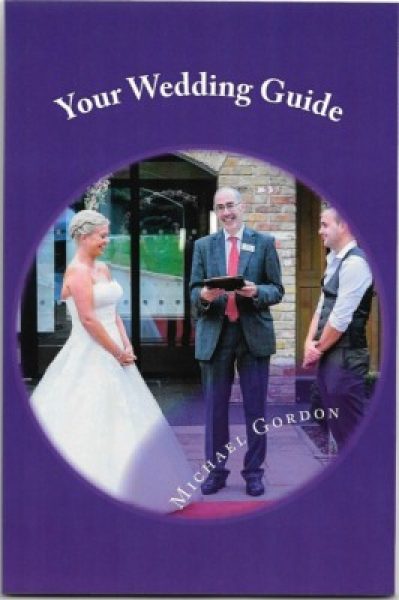
by Michael | May 1, 2018 | Blog
If you decide to plan a wedding yourself, go into it with eyes wide open.
As with most things, you have to put in the work in order to ensure success. And it doesn’t make any real difference whichever end of the market you are aiming at.
If you’re willing to take advice and are prepared to work hard, then you can do it!
Here’s how you can get started.
Hiring professionals
You are likely to be hiring professionals, which could include all or some of the following: wedding planners, photographers, caterers, celebrants and florists. How do you know which to choose?
 source: neliprahova.com
source: neliprahova.com
Don’t go with the first quote you receive, even if it seems reasonably-priced. Ask two or three suppliers. Better still, try and arrange a personal meeting. Skype or, at least, phoning are a good second best). That way you can ask questions directly and get a feel for the supplier’s personality and professionalism. If you take an instant dislike to your celebrant, say, you won’t want to work with them over the course of the year or so while the service is compiled. You certainly won’t be eager for them to conduct your actual ceremony!
Testimonials (especially first-hand) and web-sites can be very informative too.
Preparation
Obviously, don’t leave things till the last moment, but allow reasonable time. Success is in the planning.
To avoid disappointment, especially when looking at venues, get in as early as you can.
You need to be prepared (lists are good!) so that you do not spring last-minute surprises on your suppliers. Maybe you have specific dietary requirements for the caterer – don’t leave them till the day before!
You need to read Ts & Cs carefully and be sure of what you can expect from the supplier.
Venue
You will have to choose your venue carefully. Depending on budget and climate, the world is almost your oyster. You can save money by planning the wedding out of season or at an unusual venue (such as a beach or field). The time of day of the reception can also be significant for pricing.
Expenditure
If you are trying to reduce expenditure, take care not to stint on what really matters to you (be it clothing, the guest-list or whatever). You might be able to cut some corners elsewhere. It should go without saying, but don’t take unilateral decisions! Consult with your partner before you act!
Keep within budget!
Don’t forget to organise accommodation, both for yourself and for out-of-towners, if necessary.
If you leave yourself plenty of time (and make notes and ask questions), there’s no reason at all why your big day can’t go completely smoothly. As long as you have thought through what you want, your every desire can be fulfilled.
My gift to you
My “Wedding Countdown Checklist” details what needs to be done and by when. To receive it completely free of charge, please e-mail me at celebrant@vowsthatwow.co.uk.
Alternatively, for about £5 on Amazon, you can purchase my book “Your Wedding Guide” (https://amzn.to/2KaS6jv). You know, I can heartily recommend it!!
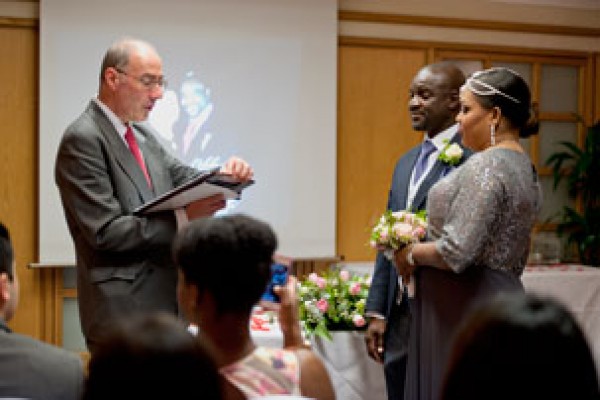
by Michael | Apr 24, 2018 | Blog
You know how conversations go in unexpected directions? I thought an acquaintance of mine had merely been on holiday. Actually, she had gone on a cruise. While at sea, the captain performed a lovely vow renewal ceremony, for herself and her husband.
Why hadn’t she thought of using me?! I had to forgive her because she wasn’t aware that I could have conducted such a ceremony. (Mea culpa …)
I wonder if the smart naval uniform might have had something to do with it too?!
I asked what had made them opt for the ceremony. They were celebrating 13 years together, and renewing their vows “just seemed like a good idea at the time”. And why not?
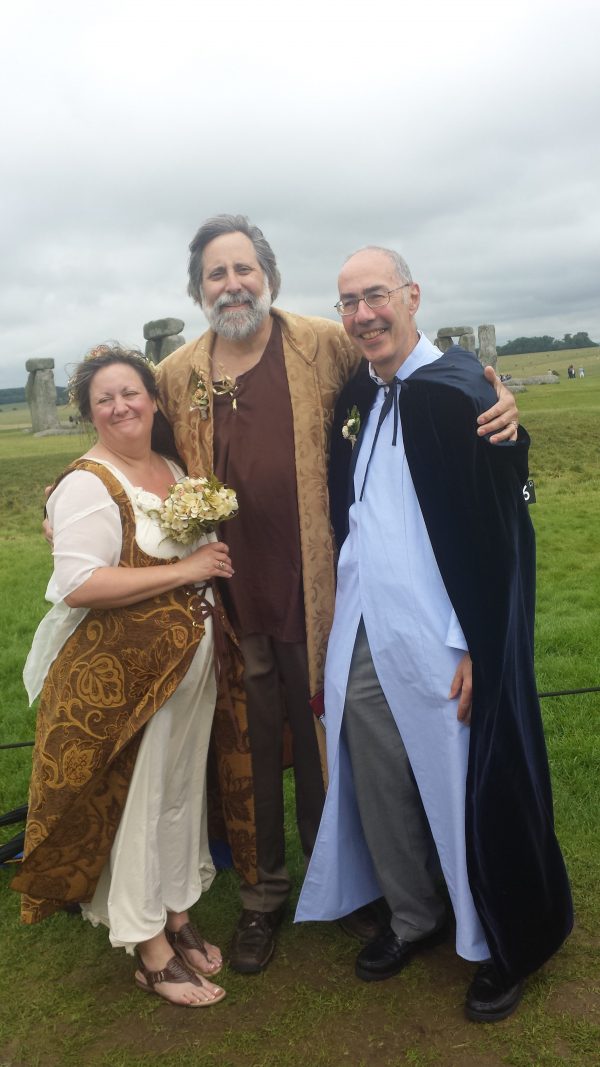
Not quite the naval uniform, though …!
So why bother renewing your vows?
- You may, like my acquaintance, be in a secure relationship, and want to mark it publicly.
- Perhaps you want to celebrate an unorthodox number (such as a 13th anniversary); commemorating a significant milestone (ending in a 5 or 0) makes sense too.
- You may originally have eloped or had a small wedding, and would now like to share your delight with your friends/family.
- Maybe your wedding didn’t meet expectations for some reason (poor weather, an argument, disappointing service) and you want to make up for it.
- You’ve come through a rough time (infidelity, illness, financial difficulties) and want to affirm to the world that you are sticking by (and with) each other.
- You want to strengthen your relationship by a public reaffirmation.
What you won’t need
Because a vow renewal is not a wedding, you won’t have to worry about any of these:
- Rings
- Hen party/stag do
- Wedding list (no, come on, you don’t need any more presents!)
- Stuffy rituals (you can organise what you want, if you have a civil celebrant)
- Venue (you can do this almost anywhere)
- A reception (unless you choose otherwise)
Organising a vow renewal is simple enough.All you have to do is fix a time, place and a date, invite some friends and choose an officiant – oh, and look forward to a wonderful, meaningful day!
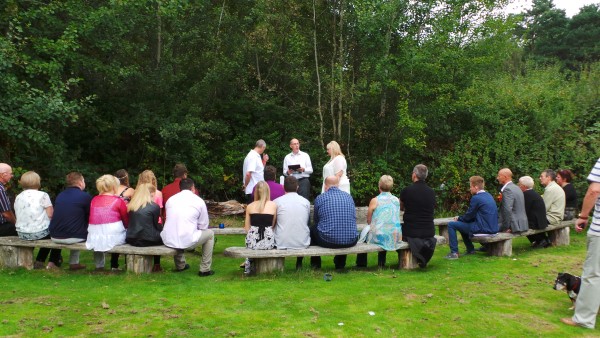
by Michael | Apr 24, 2018 | Blog
I like a wedding as much as the next man or woman – and I should: I’m a civil celebrant. But there are certain ingredients that can contribute to making a wedding very forgettable (or, sometimes, for the wrong reasons, unforgettable!). So forgive me, if I moan a bit now!
Location
I have been honoured to have been invited to present at some very distinguished and beautiful venues.
But I write as an Englishman. It may not be such fun – especially in our winter – attending a wedding at a mill in a remote spot. The Satnav can’t find it, and it has rained so much in the preceding days that the muddy access lane is only navigable for a 4 x 4. Which I don’t possess.
Socialising
As a guest, it’s not unusual to find yourself thrown together at the service or during the reception with people you would not normally choose to meet. The conversation often dries up after each person has responded to the inevitable “How do you know the bride/groom?”.
Or, possibly worse, you get stuck with the person who won’t stop talking.
On the other hand, what if the seating arrangements throw you up next to somebody you already know and whose company is embarrassing – an old flame, perhaps?
I’ve had complete strangers whip out their phones and show me pictures of relatives I have no desire to meet. People have expressed right-wing sentiments that Gengis Khan would have hesitated to utter, and I have had to nod politely. I’ve come across some awful bores. And, of course, talking to me might have been the last thing my dinner neighbours would have chosen.
It’s a lottery.
Dancing and music
I can’t be the only person in the world who cringes when it comes to the dancing, can I?
It’s bad enough watching the mother and groom (say) dance, but when it’s the public’s turn, I confess that I really don’t want to. It’s likely to be hot in the hall, so that might serve as an excuse for not getting to my feet. But let’s be honest: my sense of rhythm is not impressive, and if I do dance, I spend my time assuming everybody is sniggering about me. Possibly paranoia, but that’s how I feel.
And then, if I have actually found somebody I want to talk to, I can’t do it because the music is too loud.
When I think about it, I’m not sure if I should be encouraging people to have weddings!
Anybody agree?
Moan over.
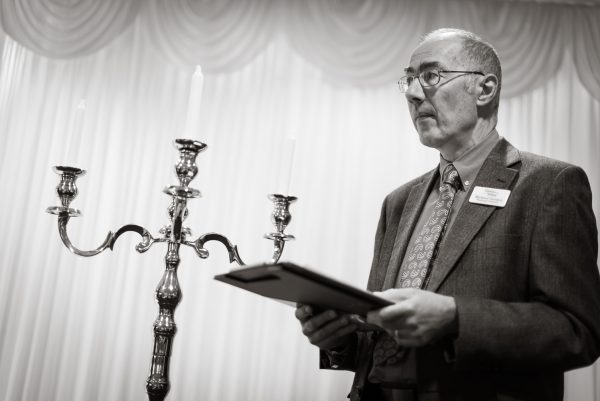
by Michael | Apr 23, 2018 | Blog
For many people, the idea of death appeals more than the prospect of public-speaking!
The likelihood is that most people will be called upon to write and deliver a speech at least some time in their life. Possibly for a family event, like a wedding, or a business presentation. Discomfort (or worse) looms large, even if it’s only a question of presenting before a handful of people.
My credentials
Only a few years ago, before I became a civil celebrant, I was terrified at speaking in front of a dozen business-people. That’s not an issue any more. In fact, I can sincerely claim to have brought the house down on two occasions with a wedding speech; I now willingly and confidently address crowds of a couple of hundred (I haven’t got to the 1000s stage, but that am sure that would be fine).
Focus
In this piece I am going to concentrate on celebration ceremonies. Content is another matter, but for now I am going to cover delivery.
10 Tips
- It is better to be brief than over-long
- If you can deliver humour successfully, do so; if not, keep those jokes to a minimum!
- Avoid too many “in-references” – at a wedding half the guests may not know anything about one of the newly-weds, so in-jokes can fall very flat – and exclude whole groups
- Start from a script (only very accomplished, experienced speakers can deliver off the cuff), and graduate to bullet-points on numbered 3″ x 5″ cards. Rehearse so that you can make your speech with only occasional reference to your notes. Eye contact is very important
- There may be a good sound system, but ensure you can be heard loudly and clearly – you can help that by not burying your head in your notes and by speaking more s-l-o-w-l-y than you might expect
- Avoid saying anything controversial, whether about the families present or about politics – the idea of the proceedings is to create a wonderful atmosphere, not to score points or secure cheap laughs!
- Use anecdotes, but ones that fit in and are relevant. Avoid meandering ‘shaggy dog’ stories that may lose your audience. Be very sure whether that embarrassing story about the bride will be well-received!
- I stress that delivery should be slower, rather than faster, and do not be afraid of a silence (for effect). Try not to address just one area of the room, but make everyone feel included. Smile – at least, at the beginning and end.
- If very nervous, try a few deep breaths before you start. Remember, the guests will be on your side, and willing you to do well
Remember that it is a privilege to be asked to give a speech, so be grateful. Remember your audience at all times.
Oh, and, however nervous you may be, save the alcohol for afterwards!
Public speaking really doesn’t even compare with death! Enjoy the occasion.

by Michael | Apr 18, 2018 | Blog
Weddings are (normally!) happy events. Children can usually be accommodated easily enough, if space and budget permit. But, of course, kids have limited attention spans.
I certainly well remember officiating at a funeral where a child decided this would be a good place to seek attention, and all but ruined the occasion for everyone.
If you’re arranging a civil ceremony, you will have a lot of input into what goes into your big day. You may have less freedom of choice when it comes to children.
Firstly, do you invite them at all?
Three answers
Well, there’s no short answer.
1. If you already have your own children, you will probably want to have others there. That’s assuming yours are going to attend (as surely they must).
2. If you don’t have any of your own, you may well resent the risk of other children spoiling your ceremony.
3. You may not feel able to invite children, because you won’t have room or, more likely, can’t afford extra guests. For the reception, you may need to bear in mind that children 12 and over will usually be charged full price by the venue.
One consequence
If you don’t invite children, their parents may not attend, which is something you must be ready for. At least, give plenty of warning (for them to arrange childcare). You also need to be consistent in your policy (for obvious reasons!). Only young bridesmaids or page boys etc. should be the exceptions.
Whatever you decide, make sure the invitation is clear.
Making the best of it!
If you do invite children, there are ways to minimise any negative impact they may have.
The ceremony
At the ceremony, ask the ushers to seat those with toddlers at the end of rows, so that a sudden urgent visit becomes less disruptive.
Maybe you could put a treat (a box of raisins, say, or a party bag) in with the order of service, so the children have something to occupy them for a while.
The reception
You may be able to put on some entertainment for the kids – a magician, balloon modeller, for example. If the venue is OK with it (and the weather permits!), you might be able to offer outside games such as Connect4, which can be hired easily enough. If you have a bouncy castle, remember that that will need a responsible adult attendant throughout.
Be aware of health and safety issues – is there an unguarded pond? Are there trailing cables?
The meal
Try and consider youngsters’ tummies when planning their menu. A two-year-old and a twelve-year-old will not want the same food, and probably neither wants the same as the adults are having! High chairs may need to be provided. Some sort of distraction is worth offering during a potentially lengthy meal (if only crayons and a book). Depending on numbers, you may want to group children according to age.
A couple of extra thoughts
A first-aid kit should be available at the venue, but you should arrange to bring plasters, high factor sun-tan cream, Calpol and anti-bite cream too.
Finally, you may like to offer a play tent with (quiet) board games, craft materials or fancy dress clothes; or bubble-blowing equipment. Lego can be a good idea too.
Happy children will mean happy adults, so don’t underestimate these ideas!









